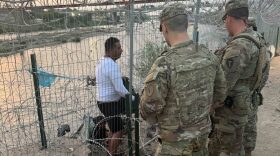Bernie Sanders’ proposals for free education and healthcare were flatly rejected by those who said "we are not Denmark". A new book argues that the policies and protections in Nordic countries don't work because of shared benevolence, but because they benefit everyone's selfish interests. Today, a Finnish expat gives the US a pep talk.
Then, Zarif Khan migrated to America in the early 20th century and became prosperous and beloved in his Wyoming town...though the law prevented his citizenship.
Listen to the full show.
How We Can Be More Nordic
This election season has raised questions about whether the United States would or could integrate a more "socialist" system. For many Americans, stories of paid parental leave, free college education, and health care are exactly that – stories.
Journalist Anu Partanencame to America from Finland - full of respect for American optimism, ingenuity and social mobility. Instead she found anxiety, frustration and exhaustion. In her book The Nordic Theory of Everything, she argues that Nordic policies don't work because - as many Americans believe - Finns, Swedes and Danes have a natural affinity for each other. They work because they benefit everyone's self interest. We first read about her theory in The Atlantic, where she wrote the article "What Americans Don't Get About Nordic Countries."
Vexillonaire
Vexillologists study flags, focusing on their history, category, and usage, but some flag historians go a step further, going out into the world and lobbying for more beautiful flags.Roman Marsfrom the podcast 99% Invisible looked into a heated flag design debate that happened in Portland, Oregon.
Listen to this story again at PRX.org.
Citizen Khan
In fall of 2015, members of a small Muslim population in Wyoming came together and bought a house in the northeastern town of Gillette with the goal of turning it into a mosque - the third in the state. A group called "Stop Islam in Gillette" emerged and responded with protests and threats of violence - arousing the interest of the FBI. It's by now a familiar narrative - local groups rejecting foreigners and newcomers - but in this case, the Muslim community is neither foreign nor new. Many trace their roots back to the frontier- era American West and have been considered locals in Gillette for far longer than some of those now openly harassing them.
Kathryn Schulz won a Pulitzer Prize for her feature on the seismic risk in the Pacific Northwest. She is a staff writer for the New Yorker, where we read her article, "Citizen Khan" - a profile of Zarif Kahn, the successful businessman and patriarch of what is today nearly 20% of Wyoming's Muslim population.
An Unofficial Embassy
All immigrants coming to this country face uncertainty:where to settle, how to make a living. The one thing they can usually rely on is an embassy or a consulate, a little piece of their home country on US soil. But Luqman Barwari comes from an ethnic homeland with no defined borders and no diplomatic nerve center. So he's created his own informal embassy in the northern suburbs of L.A., one aimed at keeping his people connected and his culture alive, which is not always easy. Producer Taylor Haneybrings us the story.
You can listen to this story again at PRX.org.







